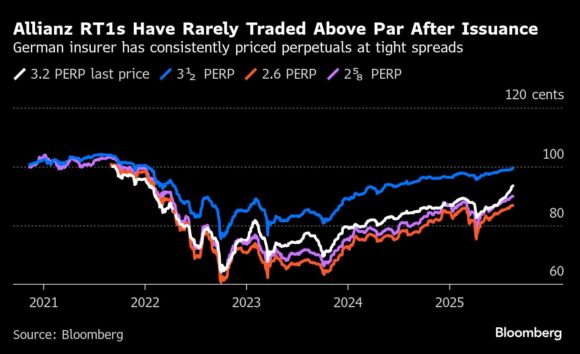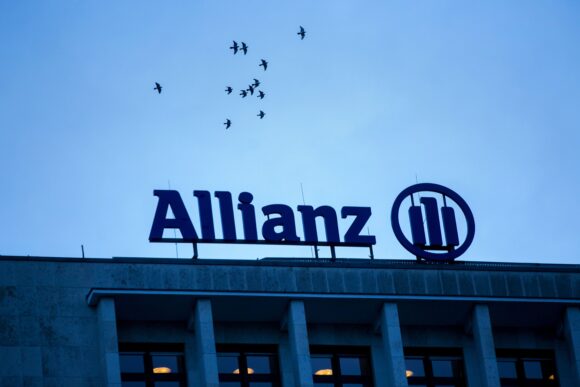Allianz SE sold $1.25 billion of perpetual notes Tuesday, the German insurer’s latest batch of risky bonds that investors said could set the tone for the subordinated debt market.
The Restricted Tier 1 bond has an annual coupon of 6.55%, down from initial price talk of about 7.125%, according to a person familiar with the matter who asked not to be identified. The deal’s book size closed above $7 billion, after investors placed more than $12.3 billion of orders.
Investors in insurance RT1s and the equivalent Additional Tier 1s in banking — both deeply subordinated junior bonds — are starting to raise red flags about pricing no longer capturing the risks. With AA-rated Allianz being the largest issuer of RT1s, Tuesday’s sale was set to be a benchmark.
“Where they print will give you a very good insight in terms of how investors are thinking about the different risks around the AT1 or RT1 market,” said Laurent Frings, head of European credit research at Aegon Asset Management.
In Frings’ view, the risk of default or a skipped coupon is very low with a name like Allianz. That leaves the question of whether the insurer calls the perpetual debt — known as extension risk — as the main factor to consider for its RT1s.
“When you have an issuer who’s very open that they will take an economic call policy with those instruments, it would be very interesting to see to what extent investors price this properly,” he said.
All four of Allianz’s existing RT1 bonds have mostly traded below face value since they were issued, as traders can’t tell whether any subsequent issues will be cheap enough to replace them.

The company is also looking to buy back as much as $1 billion of a $1.25 billion RT1 note at 99.65% of face value. That process is expected to last several weeks, with the note callable at par in mid-November.
Tuesday’s offering pushed annual RT1 supply to a record, beating last year’s €5.78 billion ($6.75 billion), according to data compiled by Bloomberg.
“With yield-hungry investors actively seeking opportunities, the outlook for the RT1 segment remains positive,” said Dinesh Pawar, head if insurance debt at Twelve Securis. “Both supply and demand dynamics suggest that momentum will carry forward.”
A representative for Allianz declined to comment. The Munich-based company accounts for just over 13% of the whole RT1 market, according to data compiled by Bloomberg.
Investors in the AT1 market have recently started raising alarm about tight spreads, after these hit a record low last week. Because of the structure of perpetual bonds, tight spreads increase the risk of skipped call options, making their performance unpredictable and leaving holders open to steep losses.
Spreads in nearly 90% of existing RT1s have tightened by a quarter since issuance on average. Allianz has sold four of the seven tightest spreads ever recorded in the euro and US dollar RT1 market, Bloomberg-compiled data show.
Photograph: The Allianz SE logo sits on a top of a building in Berlin, Germany, on Wednesday, Jan. 4, 2017. Photo credit: Krisztian Bocsi/Bloomberg
Was this article valuable?
Here are more articles you may enjoy.



 Zurich Insurance Profit Beats Estimates as CEO Eyes Beazley
Zurich Insurance Profit Beats Estimates as CEO Eyes Beazley  Preparing for an AI Native Future
Preparing for an AI Native Future  World’s Growing Civil Unrest Has an Insurance Sting
World’s Growing Civil Unrest Has an Insurance Sting  Florida Regulators Crack the Whip on Auto Warranty Firm, Fake Certificates of Insurance
Florida Regulators Crack the Whip on Auto Warranty Firm, Fake Certificates of Insurance 

